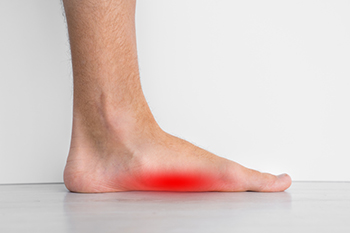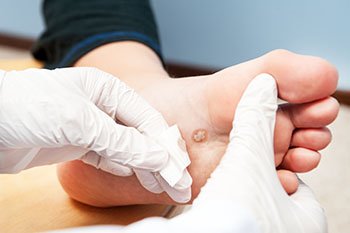Items filtered by date: April 2023
Are You Suffering From Nerve Damage?
Bunions May Cause Toe Pain

A bunion is a bony protrusion that forms on the side of the big toe and may cause toe pain. The pain may come from the joints in the big toe as the bunion pushes it out of alignment. The big toe may be swollen, red, and stiff, and may worsen until medical attention is received. This condition is caused by wearing shoes that do not have adequate room for the toes to move freely in. A small bump can develop, causing a deformity in the big toe. This toe contributes significantly to walking, rising up on the balls of the feet, and maintaining the body’s balance. Toe pain can cause difficulty in accomplishing these moves, and relief is often sought. This can begin with choosing shoes that fit correctly and wearing custom-made orthotics may help the affected foot to regain alignment. Large bunions may cause the toes to shift toward each other, and the toe pain may become severe. If you have toe pain, it is suggested that you consult with a podiatrist who can effectively diagnose a bunion, and offer you treatment to alleviate any toe pain it may cause.
Toe pain can disrupt your daily activities. If you have any concerns, contact one of our podiatrists of The Sun Healthcare & Surgery Group. Our doctors can provide the care you need to keep you pain-free and on your feet.
What Causes Toe Pain?
Most severe toe pain is caused due to a sports injury, trauma from dropping something heavy on the toe, or bumping into something rigid. Other problems can develop over time for various reasons.
Toe pain can be caused by one or more ailments. The most common include:
- Trauma
- Sports injury
- Wearing shoes that are too tight
- Arthritis
- Gout
- Corns and calluses
- Hammertoe
- Bunions
- Blisters
- Ingrown toenails
- Sprains
- Fractures (broken bones)
- Dislocations
When to See a Podiatrist
- Severe pain
- Persistent pain that lasts more than a week
- Signs of infection
- Continued swelling
- Pain that prevents walking
Diagnosis
In many cases the cause of toe pain is obvious, but in others, a podiatrist may want to use more advanced methods to determine the problem. These can range from simple visual inspections and sensation tests to X-rays and MRI scans. Prior medical history, family medical history, and any recent physical traumatic events will all be taken into consideration for a proper diagnosis.
Treatment
Treatments for toe pain and injuries vary and may include shoe inserts, padding, taping, medicines, injections, and in some cases, surgery. If you believe that you have broken a toe, please see a podiatrist as soon as possible.
If you have any questions please feel free to contact our offices located in Antioch, Martinez, and Concord, CA . We offer the newest diagnostic tools and technology to treat your foot and ankle needs.
Interesting Facts About Children’s Feet

The foot has 26 bones, and numerous tendons and ligaments. An infant’s feet are made of soft cartilage, and wearing shoes and socks that fit correctly can help to maintain their natural shape. It is interesting to know that a child’s foot will grow to approximately half of their adult foot size in the first year, making it an important developmental stage. A good foot care routine for your child can start with washing and drying their feet thoroughly. Trimming the toenails regularly is important, and parents should follow the line of the toenail and refrain from cutting them too short. Many parents choose to have their children walk barefoot while indoors, and this may be beneficial in strengthening the overall foot. When it is time to purchase shoes when walking is done outdoors, it is helpful to choose shoes that are supportive. If you have questions about your child’s foot development, it is suggested that you confer with a podiatrist who can address any concerns you may have.
Making sure that your children maintain good foot health is very important as they grow. If you have any questions, contact one of our podiatrists of The Sun Healthcare & Surgery Group. Our doctors can provide the care you need to keep you pain-free and on your feet.
Keeping Children's Feet Healthy
Having healthy feet during childhood can help prevent medical problems later in life, namely in the back and legs. As children grow, their feet require different types of care. Here are some things to consider...
Although babies do not walk yet, it is still very important to take care of their feet.
Avoid putting tight shoes or socks on his or her feet.
Allow the baby to stretch and kick his or her feet to feel comfortable.
As a toddler, kids are now on the move and begin to develop differently. At this age, toddlers are getting a feel for walking, so don’t be alarmed if your toddler is unsteady or ‘walks funny’.
As your child gets older, it is important to teach them how to take care of their feet.
Show them proper hygiene to prevent infections such as fungus.
Be watchful for any pain or injury.
Have all injuries checked by a doctor as soon as possible.
Comfortable, protective shoes should always be worn, especially at play.
If you have any questions please feel free to contact our offices located in Antioch, Martinez, and Concord, CA . We offer the newest diagnostic and treatment technologies for all your foot and ankle needs.
Flat Feet in Adults

The arch of the foot is absent in people who have flat feet. This condition is noticeable when the foot remains completely flat when standing on the floor. The majority of babies are born with flat feet, and the arch generally develops in the teenage years. Existing medical conditions, such as diabetes, muscular dystrophy, and arthritis may lead to having flat feet as an adult. Treatment may be necessary if there is pain associated with this ailment. This can consist of wearing custom-made orthotics, performing specific foot stretches, and losing weight if applicable. It is beneficial to measure the feet before purchasing new shoes, in addition to allowing enough room in the top of the shoes. It can also help to wear shoes that have a low heel and to choose shoes that are suited to the activity being performed. It is suggested to people who have flat feet that they are under the care of a podiatrist who can offer effective relief solutions.
Flatfoot is a condition many people suffer from. If you have flat feet, contact one of our podiatrists from The Sun Healthcare & Surgery Group. Our doctors will treat your foot and ankle needs.
What Are Flat Feet?
Flatfoot is a condition in which the arch of the foot is depressed and the sole of the foot is almost completely in contact with the ground. About 20-30% of the population generally has flat feet because their arches never formed during growth.
Conditions & Problems:
Having flat feet makes it difficult to run or walk because of the stress placed on the ankles.
Alignment – The general alignment of your legs can be disrupted, because the ankles move inward which can cause major discomfort.
Knees – If you have complications with your knees, flat feet can be a contributor to arthritis in that area.
Symptoms
- Pain around the heel or arch area
- Trouble standing on the tip toe
- Swelling around the inside of the ankle
- Flat look to one or both feet
- Having your shoes feel uneven when worn
Treatment
If you are experiencing pain and stress on the foot you may weaken the posterior tibial tendon, which runs around the inside of the ankle.
If you have any questions please feel free to contact our offices located in Antioch, Martinez, and Concord, CA . We offer the newest diagnostic and treatment technologies for all your foot and ankle needs.
What Do Plantar Warts Look Like?

Plantar warts are a particular kind of condition of the foot that can be unsightly and potentially diminish the health of one’s feet. These warts can develop on the bottoms or soles of the feet. Many patients will often ask what plantar warts look like and how a person might go about identifying a plantar wart. The answer is that plantar warts on the feet fortunately all basically look similar, even though they may vary in size. For example, most plantar warts on the feet will be somewhat round in shape. Additionally, a plantar wart will most likely be flat as opposed to being raised. The plantar wart can also have an outer layer to the wart that is rough and tough in texture. Lastly, plantar warts will have a black dot at the center of the wart. If you are someone that is living with plantar warts it is highly suggested that you contact a podiatrist for treatment.
Plantar warts can be very uncomfortable. If you need your feet checked, contact one of our podiatrists from The Sun Healthcare & Surgery Group. Our doctors will assist you with all of your foot and ankle needs.
About Plantar Warts
Plantar warts are the result of HPV, or human papillomavirus, getting into open wounds on the feet. They are mostly found on the heels or balls of the feet.
While plantar warts are generally harmless, those experiencing excessive pain or those suffering from diabetes or a compromised immune system require immediate medical care. Plantar warts are easily diagnosed, usually through scraping off a bit of rough skin or by getting a biopsy.
Symptoms
- Lesions on the bottom of your feet, usually rough and grainy
- Hard or thick callused spots
- Wart seeds, which are small clotted blood vessels that look like little black spots
- Pain, discomfort, or tenderness of your feet when walking or standing
Treatment
- Freezing
- Electric tool removal
- Laser Treatment
- Topical Creams (prescription only)
- Over-the-counter medications
To help prevent developing plantar warts, avoid walking barefoot over abrasive surfaces that can cause cuts or wounds for HPV to get into. Avoiding direct contact with other warts, as well as not picking or rubbing existing warts, can help prevent the further spread of plantar warts. However, if you think you have developed plantar warts, speak to your podiatrist. He or she can diagnose the warts on your feet and recommend the appropriate treatment options.
If you have any questions please feel free to contact our offices located in Antioch, Martinez, and Concord, CA . We offer the newest diagnostic and treatment technologies for all your foot and ankle needs.

